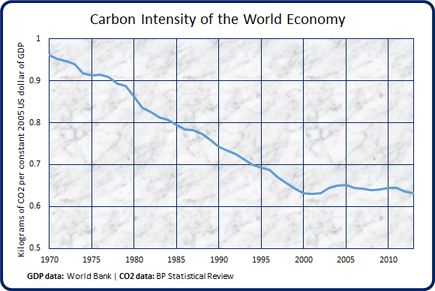Environment & Energy
Related: About this forumHowever the reduction in global CO2 emissions eventually comes about...
...economic decline is virtually sure to be a player. The reasoning is this:
For the last 15 years, the carbon intensity of the world economy has been constant, at 640 grams of CO2 per constant 2005 dollar of world GDP +/- 1.7% (according to data from BP and the World Bank).

The implication is that reducing global CO2 emissions will require (or "result in", depending on how you want to frame it) a proportional reduction in the global economy. Halving the world's CO2 emissions will necessarily be accompanied at this point by a 50% reduction in real economic output.
It's no wonder this is a third-rail issue almost on a par with overpopulation, and that politicians content themselves with nibbling around the margins with policies and proposals that make them look good but accomplish nothing of any significance - at least where the reduction of global CO2 emissions are concerned.
A more hard-nosed ecological perspective is that if we do manage to save the planetary biosphere from climate chaos, a collapse of the global economy will probably be involved, either as a cause or an effect.
An objection to my argument on a Guardian comment thread was this:
You just need to take a look at the worldwide variations in CO2 emissions per GDP to realise there is no unalterable proportionality between the two. The EU had a GDP of 3712 $ per tonne of CO2 emissions, whereas the USA had on 2291 (2006 figures).
If most countries could achieve emissions to GDP ratios similar to the best performing ones, you could have an impressive reduction in emissions without a proportional decrease in GDP.
http://en.wikipedia.org/wiki/List_of_countries_by_ratio_of_GDP_to_carbon_dioxide_emissions
My riposte goes something like this:
What that belief fails to take into account is that the world has both a globalized economy and a global carbon problem, so looking at the performance of individual countries provides few if any guides.
The best-performing countries on the above Wikipedia list (on a PPP/tonne basis) are all highly impoverished nations like are Chad and Afghanistan. The UK and Equatorial Guinea have about the same ranking for carbon intensity. The same goes for Norway and Haiti. The USA has an "average" performance. The worst performing country is Zimbabwe. What conclusions are we to draw from these facts? One I can think of is that no country's GDP is independent any more. because of tighter trade and transportation linkages, countries who do well in the carbon intensity sweepstakes depend on the economies of other countries who do less well, and vice versa.
And it goes without saying that CO2 emissions are a global problem.
In order to parse the problem realistically, one has to use global GDP and global CO2 emissions, NOT national numbers.
The fact that the globalized carbon intensity has been stable for so long should be an enormous red flag for the solutionistas.
Is there a solution? Perhaps if all nations adopted economies like Burkina Faso or Mali we could make inroads on the problem?
This is precisely the argument that is made either overtly or covertly by political and economic leaders to trigger a system justification response in their followers. That response entrenches otherwise intelligent people against any plans to reduce CO2 emissions, because they come to see any potential for (or even simple discussion of) CO2 reduction as a system threat. The system under threat is the very one that they need to survive - the one that issues their paychecks. This position is self-justified by a belief that casts the whole idea of climate change as a hoax, possibly rooted in some sort of a plot fomented by scientists and Marxists.
Facts have a very hard time in a psychological environment like this.
Unfortunately, the big problem is that the carbon/economy linkage that triggers the system justification response ... is probably true.
daleanime
(17,796 posts)kristopher
(29,798 posts)And just as wrong for the same reasons.
GliderGuider
(21,088 posts)I wish you the best of luck with that. I hope you turn out to be right and we finish the planetary reconstruction job we started in 10,000 BCE using renewable energy sources like we did at the beginning.